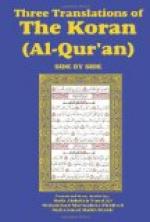3 The usual rendering is read. But the word qaraa, which is the root of the word Koran, analogous to the Rabbinic mikra, rather means to address, recite; and with regard to its etymology and use in the kindred dialects to call, cry aloud, proclaim. Compare Isai. lviii. 1; 1 Kings xviii. 37; and Gesen. Thesaur. on the Hebrew root. I understand this passage to mean, “Preach to thy fellow men what thou believest to be true of thy Lord who has created man from the meanest materials, and can in like manner prosper the truth which thou proclaimest. He has taught man the art of writing (recently introduced at Mecca) and in this thou wilt find a powerful help for propagating the knowledge of the divine Unity.” The speaker in this, as in all the Suras, is Gabriel, of whom Muhammad had, as he believed, a vision on the mountain Hirâ, near Mecca. See note 1 on the next page. The details of the vision are quite unhistorical.
4 This, and the following verses, may have been added at a later period, though previous to the Flight, and with special reference, if we are to believe the commentators Beidhawi, etc., to the opposition which Muhammad experienced at the hands of his opponent, Abu Jahl, who had threatened to set his foot on the Prophet’s neck when prostrate in prayer. But the whole passage admits of application to mankind in general.
5 That is Muhammad. Nöldeke, however, proposes to render “a slave.” And it is certain that the doctrines of Islam were in the first instance embraced by slaves, many of whom had been carried away from Christian homes, or born of Christian parents at Mecca. “Men of this description,” says Dr. Sprenger (Life of Mohammad. Allahabad. p. 159), “no doubt prepared the way for the Islam by inculcating purer notions respecting God upon their masters and their brethren. These men saw in Mohammad their liberator; and being superstitious enough to consider his fits as the consequence of an inspiration, they were among the first who acknowledged him as a prophet. Many of them suffered torture for their faith in him, and two of them died as martyrs. The excitement among the slaves when Mohammad first assumed his office was so great, that Abd Allah bin Jod’an, who had one hundred of these sufferers, found it necessary to remove them from Makkah, lest they should all turn converts.” See Sura xvi. 105, 111; ii. 220.
6 Lit. hast thou seen if he be upon the guidance.
7 The principal men of the Koreisch who adhered to Abu Jahl.
8 During a period variously estimated from six months to three years from the revelation of this Sura, or of its earliest verses, the prophetic inspiration and the revelation of fresh Suras is said to have been suspended. This interval is called the Fatrah or intermission; and the Meccan Suras delivered at its close show that at or during this period Muhammad had gained an increasing and more intimate acquaintance with the Jewish and Christian Scriptures. “The




